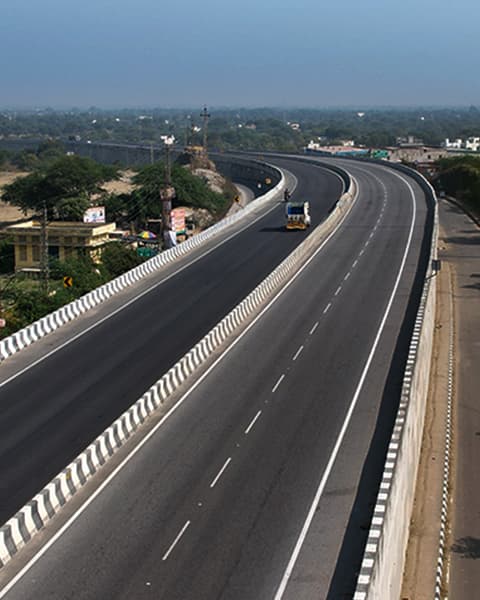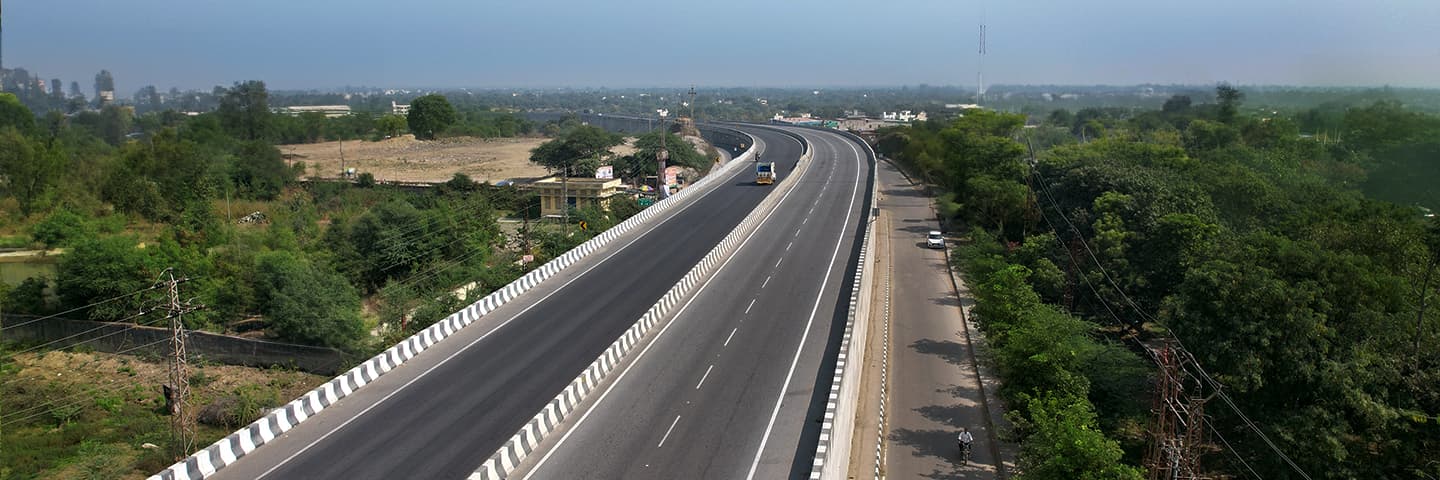Number of Lanes
4
Distance
87.25 Km
Original Concession Period
30 Years

Bhilwara-Rajsamand Tollway Private Limited (BRTPL) operates an 87.25 km stretch on National Highway 758 in Rajasthan, which is part of the National Highways Development Project (NHDP) Phase IV. This 4-lane road project was awarded a 30-year toll concession by the National Highway Authorities of India in 2011-2012 through competitive bidding. The project follows the Design, Build, Finance, Operate, and Transfer (DBFOT) basis, and it has been operational since June 2016, with nearly 23 years of remaining concession life.
The project highway provides essential connectivity to NH-8, one of India's busiest national highways, as well as to the Golden Quadrilateral. Additionally, it links with the major city of Bhilwara, renowned for its textile industry. The road plays a crucial role in facilitating transportation due to its connectivity.
The project includes 1 railway overbridge (ROB), 1 major bridge, 16 minor bridges, 3 vehicular underpasses (VUPs), 16 pedestrian underpasses (PUPs), 2 truck laybys, and 2 toll plazas. Notably, this project stands as one of the few in the National Highways sector with a continuous four-lane facility from the beginning to the end of the corridor, providing a superior and uninterrupted driving experience for road users.
The Bhilwara-Rajsamand road is a significant infrastructure development in Rajasthan, Commercial toll operations began on June 4, 2016, and the final Completion certificate was obtained on June 30, 2017.
Benefits of the Project Road
Enhanced Connectivity: This project has significantly improved connectivity, bridging previously isolated regions with major urban centres, which has facilitated the smoother movement of goods, services, and people.
Improved Safety: Safety enhancements incorporated into the project, such as enhanced signage, improved lighting, and wider lanes, have led to a notable reduction in accidents and fatalities, contributing to safer travel conditions.
Reduced Travel Times: The modernization of the project road has resulted in a substantial reduction in travel times for both daily commuters and long-haul transportation. This has not only increased efficiency but has also reduced fuel consumption.
Economic Growth: The upgraded road infrastructure has attracted investments, stimulating economic growth and rendering the region more accessible to businesses. This, in turn, has led to job creation and expanded economic opportunities for local communities.
Impact on Road Users
Commuters: Commuters now enjoy shorter travel times and increased safety, leading to an enhanced quality of life. Reduced travel times and improved road conditions contribute to more efficient and secure daily commuting.
Truck Drivers: Long-haul truck drivers benefit from decreased transit times and reduced operating costs. This boosts the efficiency of the logistics industry and makes the transportation of goods more economical.
Tourists: Improved road conditions have made the region more appealing to tourists, which, in turn, has had a positive impact on local tourism and hospitality businesses. The region has become a more attractive destination for visitors, leading to increased economic opportunities for those in the tourism sector.
Impact on Communities
Economic Development: Local communities have experienced economic growth as a result of increased economic activity, including the establishment of new businesses, manufacturing ventures, and tourism-related enterprises. This has bolstered the economic prospects of the region.
Employment Opportunities: The project has created valuable job opportunities for residents in various sectors, including construction, maintenance, and associated works related to project development and maintenance activities. Additionally, toll operations have provided employment opportunities, benefiting the local workforce.
Infrastructure Development: The project has been a catalyst for the development of ancillary infrastructure, such as hotels, restaurants, and service stations, which has significantly benefited local entrepreneurs. Fuel station growth in the project section has increased by an impressive 400% since the project was awarded.
Environmental Impact: Environmental considerations have been a priority for the road project, and measures have been implemented to preserve and promote ecological sustainability. This includes planting over 42,000 trees along the road corridor, contributing to environmental conservation and enhancing the visual appeal of the region.
Accolades
The project has been certified under six ISO certification categories:
- ISO 9001:2015 Quality Management System
- ISO 14001:2015 Environmental Management System
- ISO 39001:2012 Road Traffic Safety Management System
- ISO 45001:2018 Occupational Health and Safety Management System
- ISO 31000:2018 Risk Management
- ISO 27001:2022 Information Security and Management System
Bhilwara - Rajsamand Tollway Private Limited (BRTPL)
CIN: U45203TN2012PTC165785

